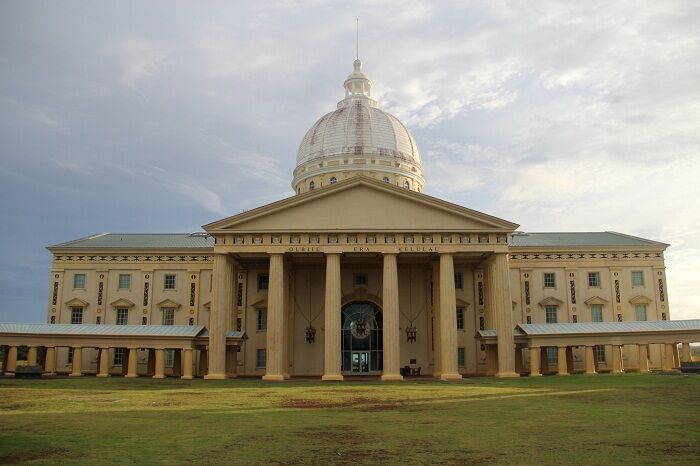KOROR (Island Times/Pacnews) — Palau’s national legislature has called on President Surangel Whipps Jr. to take urgent action to ensure Palauan citizens deported from the United States are returned directly to Palau, not to offshore detention centers such as the U.S. naval base at Guantanamo Bay.
In a joint letter dated June 21, 2025, Senate President Hokkons Baules and House Speaker Gibson Kanai, speaking on behalf of the Olbiil Era Kelulau or OEK, urged the president “to take any and all steps necessary” to prevent Palauan deportees from being sent to facilities like Guantanamo.
“If any Palauan citizen is to be legally removed from the United States, such citizen should be deported to Palau,” the letter stated.
The lawmakers’ appeal follows recent reports that nationals from the Federated States of Micronesia and the Republic of the Marshall Islands have been detained by U.S Immigration and Customs Enforcement (and sent to Guantanamo Bay, a facility originally designed to hold terrorism suspects after the September 11 attacks.
Marianas Variety reported that at least one Marshallese national is currently being held at the Guantanamo facility, citing confirmation from Marshall Islands Ambassador to the United States Charles Paul.
The developments come amid a renewed immigration crackdown under President Donald Trump’s policies, which are reportedly being reinstated. According to Nation News, 72 individuals from 26 countries — including citizens of the FSM and RMI — were transferred to Guantanamo recently as part of ICE enforcement actions.
It is currently unclear whether any Palauan citizens have been affected by this policy. However, the OEK’s letter underscores mounting concern that Palauans could be swept up in similar deportation efforts.
U.S. proposal
Meanwhile, Palauans from across the nation are voicing strong and varied opinions in response to a U.S. proposal to temporarily house asylum seekers in the island nation — an idea described by the U.S. ambassador as merely a starting point for discussion.
While the proposal remains in its early stages, residents are already weighing its potential humanitarian and economic benefits against the country’s limited infrastructure and pressing social challenges.
“This is not the first time the U.S. has asked Palau for this deal,” said one woman, referencing a similar arrangement made under former President Johnson Toribiong’s administration. “The refugees didn’t do anything bad while staying here. Belau [Palau] got paid a significant amount of money for the deal.”
Still, concerns about Palau’s capacity to accommodate non-citizens remain prominent. A 68-year-old woman emphasized the need for containment and funding if the proposal moves forward. “If we do agree, the U.S. has to be able to fund them and also have them refrain from the public — maybe a gated community,” she said.
For others, the issue touches on deeper frustrations about domestic conditions and the slow pace of national development.
“I think at this time, we need to prioritize our own people,” said Hadleen Medalarak, a community advocate. “Our people are steadily migrating to the U.S. in search of better opportunities, while we face a low birth rate and increasing deaths each year.”
Medalarak listed multiple hardships faced by Palauans: rising costs of basic necessities like food and water, skyrocketing utility prices with incomplete services, a crowded Koror with little space for growth, and an under-equipped national hospital lacking doctors and medicine.
“Let’s think of our displaced people first before we accommodate refugees,” she said. “Once we have developed our nation and our people are thriving and content, then we can consider how to accommodate asylum seekers.”
A 46-year-old man pointed to another local concern: “Hopefully we will not accept them because we already have a huge underlying problem on our island, and that is drugs.”
Still, not all voices oppose the idea. A 47-year-old woman supported the proposal in principle but emphasized the importance of negotiations and proper vetting. “It could be a good idea to bring in refugees,” she said, “but we must have background checks to make sure they are not criminals. If they have professions — like teachers, doctors, or farmers — they can really help.”
Another man echoed the call for practical conditions, suggesting refugees could perform public service while awaiting their asylum processing. “Put them to work — not paid, of course — just during the waiting time. Maybe they can clean the roads or cut the bushes on the roadside,” he said.
Still, some stress the moral and political balance Palau must maintain.
“If Palauan leaders are considering bringing refugees to our shores, please ask the U.S. government for the funding needed to support them,” said one respondent. “But just as importantly — if not more — please don’t forget the countless Palauans who are struggling right now.”
U.S. Ambassador to Palau Joel Ehrendreich stated during a joint session of the Olbiil Era Kelulau, that the proposal is not finalized, but rather an opening for dialogue on future cooperation.












